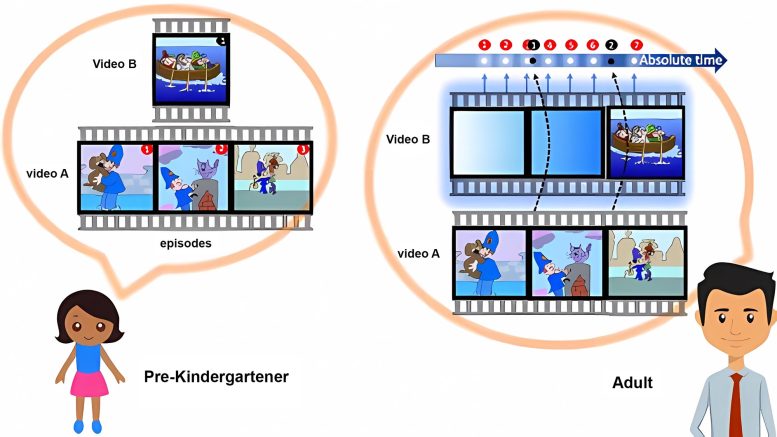
Time can play tricks on us, causing the same period to feel different depending on our age. For example, while the summers of our childhood felt like they lasted forever, the same three months now seem to fly by in the blink of an eye.
Researchers at Eötvös Loránd University have investigated whether the perception of time changes with age, and if so, how, and why we perceive the passage of time differently. Their study was published in the journal Scientific Reports.
Time can do tricks. Many of us experienced the illusion that those long summers during childhood felt so much longer than the same 3 months feel like now as an adult. While we can argue why one summer may appear longer than the other and how the percept of time can compress and dilate durations depending on various factors, we can easily set up an experiment to gain more insights.
The researchers just did that. They asked how eventfulness affects our duration estimates when probing at different milestones during our cognitive development. They set aside three age groups, 4-5, 9-10, and 18 years and older, and made them watch two videos, 1 minute each. The two videos were extracted from a popular animated series, balanced in visual and acoustic features, except for one feature: eventfulness. One video consisted of a rapid succession of events (a policeman rescuing animals and arresting a thief), and the other was a monotonous and repetitive sequence (six shady prisoners escaping on a rowing boat). The researchers played the two clips in a balanced order of 50%, watching the eventful first. After watching both videos, they asked only two questions: “Which one was longer?” and “Can you show the durations with your arms?” Easy to understand questions even for a 4-year-old.
The results showed a strong bias in each age group but for pre-kindergarteners, surprisingly, in the opposite direction.
While more than 2/3rd of pre-kindergarteners perceived the eventful video as longer, 3/4th of the adult group felt the same about the uneventful video. The middle group expressed a similar but more moderate bias than the adult. By the inclusion of the middle group (9-10-year-olds), the inflection point could be estimated around the age of 7. Regarding the arm-spread orientation, and distance, there was an increasing trend of using horizontal arm spreading with age. While pre-kindergarten-age kids used 50-50% vertical and horizontal gestures, by school age, that ratio changed to 80-90% in favor of horizontal arm expressions.

Researchers at Eötvös Loránd University have investigated whether the perception of time changes with age, and if so, how, and why we perceive the passage of time differently. Their study was published in Scientific Reports. Credit: Nádasdy Zoltán
The result is unexpected because none of the biological models of time perception could have predicted it. How can we interpret this result? Biological models of time perception fall under two categories: pacemaker-like neurons in the brain and neurons that display a declining firing rate with time. Still, “who” would interpret those signals in the brain remains elusive. Both model classes assume a continuous age-dependent improvement with age. However, this is not what the researchers found. Instead, what they found was a switch of perceived duration ratios between the youngest and the two older groups, with a turning point at 7. How can we explain such a bias reversal?
The authors called upon the concept of heuristics, introduced in cognitive science by Amos Tversky and Daniel Kahneman. They define heuristics as mental shortcuts or proxies that enable one to make quick decisions. To understand why we need heuristics for comparing durations, let us look at what else we can rely on. Since the brain has neither a reliable central clock nor a direct sensory mapping of durations, unlike distances or pitch, we must use a proxy. A proxy to “duration” is something concrete yet related to the time content, like “Which one can I talk more about?” If the first video was packed with actions, they could tell a lot about it, thinks the 5-year-old. While the other movie could be summarized with a single verb, such as “rowing.” The eventful video consisted of three episodes, a perfect example of a story. The uneventful video, in contrast, had no episodes and no storyline. In terms of heuristics, the difference can be captured by representativeness heuristics. The eventful video had more representative story examples than the uneventful one. Therefore, relying on a representativeness heuristic, the kindergarteners would feel the eventful video was longer (see the left side of the figure).
If this notion of duration provides a good proxy for “time,” why do we switch to another system at 7? The researchers argue that the answer is switching to another class of heuristics, namely, sampling heuristics. At around the age of 6 to 10, kids learn the concept of “absolute time.” We all rely on the concept of absolute and universal time when we make appointments, organize our tasks, and follow timelines. All these actions reinforce the concept of universal time that is independent of the observer and entirely consistent with Newton’s classical mechanics. We start thinking about time as a physical entity, independent of the events that it connects, and we become aware that our subjective experience of time as observers may change or be a subject of illusions. The best we can do to eliminate subjectivity is to check the flow of time.
We can check the flow of time by frequently sampling it. Looking at the clocks or just staring out the window and watching the traffic flow. The more often we check, the more reliable the estimate we get. However, our brain is not always available for tracking time. When our attention is occupied with another task, then this sampling of the absolute time may skip cycles. In contrast, when waiting for somebody who is late for an appointment, time slows down as the brain counts the seconds while impatience and irritation increase.
In light of these heuristics, representativeness, and sampling, let us see how we sample the absolute time when we are asked to guess the duration of an exciting and captivating video versus a boring one. When watching a captivating movie, the mind is completely immersed in the story because the sequence of actions unfolds so fast that one does not have time to think about anything else, such as life, work, or a to-do list. Instead, the mind is hijacked by the alternative reality of the movie plot. In contrast, when watching a boring movie, one is going to check the watch or think about where else one could be at that time, and all these distractions enable us to sample the flow of absolute time (right side of the figure). Hence, the two types of heuristics explain the bizarre switch at about age 7 and the persistent bias that the boring meetings appear longer than they are, which stays with us for the rest of our life.
While the enigma of time has been and will continue to intrigue the human mind, it is essential to realize that these fundamental concepts, like time and space, are more complex than we can pin down by certain types of neurons in the brain. To wrangle such abstract concepts, one needs to connect all biological and cognitive pieces. Will we ever complete that jigsaw puzzle? Only time will tell.
Reference: “Children and adults rely on different heuristics for estimation of durations” by Sandra Stojic, Vanja Topic and Zoltan Nadasdy, 19 January 2023, Scientific Reports.
DOI: 10.1038/s41598-023-27419-4









“Since the brain has neither a reliable central clock ..”
That is an assumption for which no evidence is given. I have found that when I have to wake up earlier than usual for some important event, I often wake up slightly before the alarm is set to go off. My cat usually comes into my bedroom a few minutes before my alarm is regularly set to go off. It is my experience that we have biological clocks that we usually just usually ignore.
The focus on heuristics is an important part of the puzzle. The heuristics, however, physically originate in the hippocampus of the brain. The hippocampus is responsible for creating, storing, and recalling memories. It is the manner in which we use the hippocampus that creates our perception of time.
The most startling revelation about the nature of time is that there is no physical timeline. Timelines exist solely in the hippocampus of the brain. Physical matter exists only in the present moment and experiences the phenomenon of entropy. Things age in the present moment, but things do not move among physical time frames. M
Too long, didn’t read.
“RESEARCHERS DISCOVER BOREDOM. MISTAKE IT FOR TIME TRAVEL.”
My theory behind time dilation, and why younger people experience time in a slower fashion, is on the basis of experience. Because the children are young and have not experienced much in their life yet, everything that happens to them is seen as a novel concept, something unknown and “new” to them, therefore they process every bit of information at a slower rate. Thus, as we age and gain experience, things are no longer as mysterious or interesting as they once were, our brains go into a sort “autopilot” for the majority of the tasks we perform on a daily basis, and time seems to go by quicker because we are creatures of habit and do the same things day after day, year after year. Therefore, as time goes by in our life, it seems to be going quicker and quicker, because we are no longer marveling at the mundane, like a child would.
I agree with EleusisDub but I would add this. A very simple explanation: At 7 years old a year is 1/7 of your total experience and seems long. At 70 it’s 1/70th so it seems short. Relativity.
Dub and Nuggles for the win. Honorable mention:Frosted Flakes